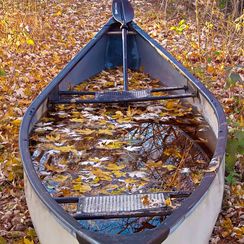| Apr/May 2015 • Poetry |
| Apr/May 2015 • Poetry |

Photograph by Rus Bowden
Sunlight and Shadow, 1884, William Merrit Chase
I
At a table under sycamores,
he lingers over coffee.
Young, lightly mustached,
in an ice-cream suit and spats,
he is looking past his tilted cup
toward a woman in a hammock,
asleep, or nearly so.
She lies withdrawn
within its curve,
one hand curled against her face,
black-stockinged ankles crossed.
The pale-rose fabric of her dress
drapes the hammock's side.Before she left her chair to rest,
they drank, ate bread,
spooned honey from a patterned jar.
He smoked, glanced at the paper
now half-folded at his feet.
Not much was said, or had to be.The air smells of his smoke,
coffee, honey, trees' leaves and bark.
Damp flower scents drift over
from the neighbor's yard
where an older woman bends,
back toward us
watering her plants.Sounds? The clink of his cup
against the saucer's edge,
the hammock's creak,
water splashing in the yard next door.
From the street,
a child's game, call-and answer,
the rattling approach and fade
of iron wheels on stone,
sounds distant, intermittent.
It is Sunday, summer, quiet here.II
Look beyond the quiet scene,
late morning, breakfast out-of-doors,
and see, just near its close,
a Henry James novella:
the young man in his linen suit
a painter
not long returned from Europe
to New York,
the woman in the hammock
an early love, first subject.
At twenty-six, the Jamesian spinster,
she teaches music
in her small front room;
in the years apart from him,
composed a life of work and friends.Unsure, since his return,
of heart or home,
he has, this Sunday morning,
made his choice.She is not, as it appears, asleep
but in retreat, regathering herself
and will, when he is gone,
collect the cups and rinse them,
put away the bread,
move back into her days' good grace.
By summer's end, or sooner,
that meeting-place of trees and sun,
the arc between those sycamores
will be her own again.
Passing Odysseus on the Way
You must...
carry your well-planed oar until you come
to a race of people who know nothing of the sea...
—The Odyssey of Homer, Bk. 11, tr. Robert Fagles
I often thought,
having heard the songs and tales,
or rewoven threads of them,
was I the one foretold
to meet him, the nameless one
Tiresias in his blindness saw?A young boy,
harnessed to the seasons,
ignorant as our newest calf,
island-born, I had never known
but one small plot of land.
The sea, what I heard of it,
hardly believed;
a white bird, a taste of salt
on the wind. Foreign. Far off.Each year, a restlessness
in my blood beat stronger,
urging against caution, habit, sense.
That day, I dropped the hay rake
where I stood and walked away
toward the edge of the world
for all I knew.The sun was high when I saw him,
my opposite in every way,
slow, heavy with years, head bent,
uneasy on uneven ground.
Closer, I stopped to stare
at the tool against his shoulder,
a pole, flat and widened at its ends.
He saw the question in my eyes,
raised it a little in greeting,
nodded and went on.As for myself,
I found my blood's calling,
found the sea.
Once on shipboard, I was home,
better with sails and cables
than ever with rake and plough.
The good days give us sea birds' wings;
others, perverse or sleeping winds
remind us we are aliens there,
cast-offs, dispossessed.And the old man I met so long ago?
I would have forgotten
were it not for the stories they tell.
If he and I cross paths again,
it may be where an oar
thrust deep in soil says
here it ends; the sea,
tumultuous enchantments,
all voyaging
and here begins the rocky soil
of birthplace, seed and rest.
Beams
"We are put on this earth... to bear the beams of love."
—William Blake
Without question, opposites,
antithetical;
immaterial, the one,
all movement, all presence,
solid, the other,
its molecules holding tight
against incursion.Yet, in these words,
Blake's words,
they come together,
the shaft of light,
the armature of rafters,
a love's accepted certainty
and its passing casual touch.Support, protection,
whatever permanence
can be hewn, contrived,
while light surrounds,
fills fissures, flaws,
moves easily, familiarly
from room to room.
Opposites conjoin.